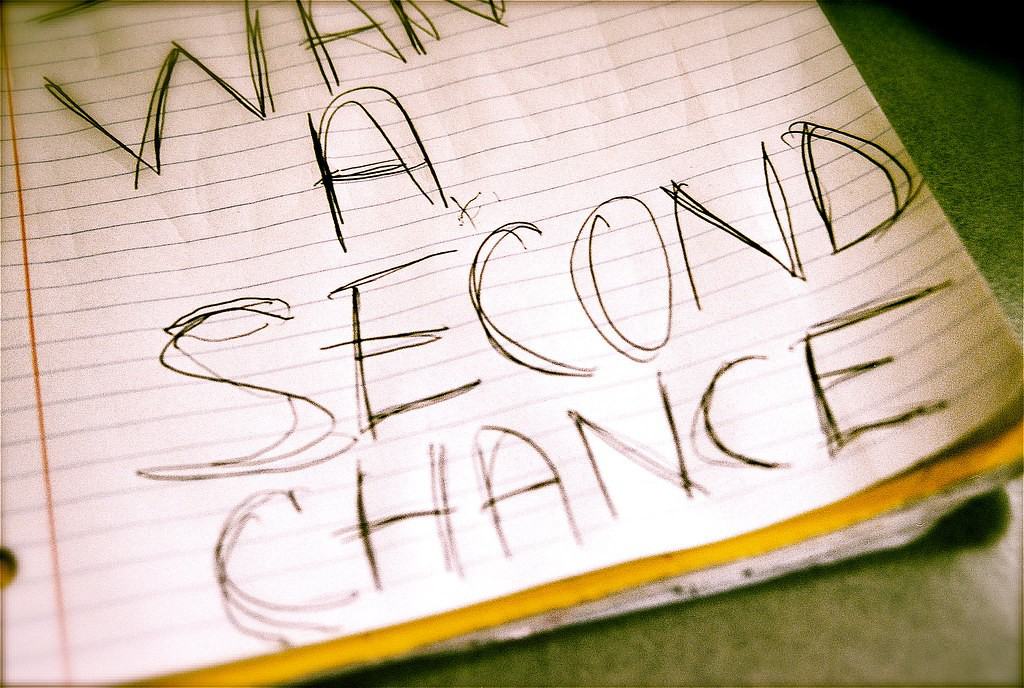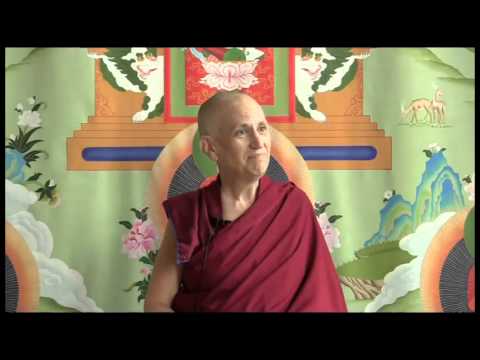Transforming Adversities into the Path
Venerable Thubten Chodron discusses techniques for transforming adversity into the path in this talk for the Bodhisattva's Breakfast Corner.
I was asked a question about a verse in the Guru Yoga practice that talks about four techniques. This concerns the thought transformation practice, and it comes in the third of the seven points in the text on thought transformation. I thought to go over the whole third section. This is at the end, so you have to wait and listen to the whole thing. It won’t all happen today.
The third section is called “Changing Adverse Circumstances into the Path.” This is something we all need to do because adverse circumstances come no matter how much we try to prevent them. It’s one of the problems with samsara, isn’t it?
So, the first point here says:
When the container and its contents are filled with evil, change this adverse circumstance into the path to full awakening.
This refers to when you are perceiving the entire atmosphere around you as awful and terrible. Maybe there’s war or incredible discord, abuse or injustice, discrimination—whatever it is in your environment. And then also internally maybe you are sick, you’re depressed, your whole word is falling apart. You lost your job; you lost your partner; your family died. Everything is a mess. You don’t have to wait until all those things happen at once. All you need is one of those things to practice. Sometimes you do have all of them at once, but just even when one of them happens you can do this practice.
So, we have to change these adverse circumstances into the path. If we don’t, what happens? They overwhelm us. Then we become angry and bitter and want revenge. This is what leads people to become terrorists or drive-by shooters. This is the cause of all this incredible violence against society. Or if we don’t transform them it leads us to become depressed, so we just mope around and do nothing, or maybe we commit suicide.
The inability to transform adversity into the path can lead to very dire results if it’s not taken care of. Since adversity comes so often, this is very, very important to know how to do. One of the ways is to think that whatever we experience is the result of our own past karma. We created that karma. Instead of getting mad at the world or being depressed, look at what this situation is actually about: in the past, probably in a previous life, under the influence of my own self-centered thought, I committed one of the ten non virtues. I harmed others, and when I harm others, I harm myself by planting this seed of negative karma in my own mindstream. I didn’t purify it because I was too busy eating ice cream and lying on the beach, so now this karma is ripening. There is nothing to be angry about. This is just the causal chain of events that happens.
The good thing is that because it ripened, it is no longer polluting my mind. And this same seed of negative karma could have ripened in a far worse kind of suffering. I could have been born in the hell realms for a long time; I could have had a greater suffering on Earth. Who knows what could have happened. There are so many things in samsara that are so much worse than what we are experiencing. So, by this karma ripening in the way it did, compared to how it could have ripened, actually that’s good. I got off lightly considering the kind of negativity I must have created in previous lives and considering that in those previous lives we’ve had plenty of time to create all sorts of negativity.
When you think like this then you feel kind of happy that this karma is ripening, and it’s finished. When [someone in the audience] had cancer, that’s how they practiced. They just thought that again and again and again. And I know that the Tibetans who were imprisoned under the communist occupation thought like this as well. I’m sure the Chinese Buddhists did as well. You just think, “This is the result of my negative karma, and it’s better that it ripens like this than in a different way. And if I don’t like this ripening then I need to be really conscientious and not do these same kinds of actions again in the future.”
I had a friend who was doing retreat at Kopan Monastery one year, and she got a huge boil on her cheek that was very, very painful. She was taking a walk one day and bumped into Lama Zopa Rinpoche. And Rinpoche looked at her and said, “What’s that?” So, she said, “It’s a huge painful boil.” And Rinpoche said, “That’s wonderful! That’s great!” Of course she wanted some pity, but Rinpoche was just rejoicing that her karma was ripening and that it was over, finished, and would no longer pollute her mind. It was no longer hanging in there waiting to ripen in a far worse way. It was really, really good.
This is the way we should think when things happen to us that we don’t like. And it doesn’t have to be something terrible, like a really bad disease. We can do this even in our daily life. For example, we were talking earlier about “bad vibes.” If you’re in a place with “bad vibes,” instead of letting your mind proliferate with all kinds of ideas about it or complaining about it, see those vibes as other beings’ suffering. And do the taking and giving meditation. Take them upon yourself and with love, give these other beings your body, possessions and virtue.
That’s enough for today I think. I gave you something to chew on. It sounds really good when you hear it like this and you’re okay. You can kind of follow it, and it sounds okay. But as soon as we get sick or as soon as somebody criticizes us, we don’t even remember it. “Goodbye!” If somebody comes up and says, “Please reflect that it’s due to your negative karma,” we just respond, “What are you doing, blaming me for this? Why don’t you help me?” Our whole Dharma understanding is out the window, isn’t it?
Questions & Answers
Audience: When I cook, I like to make sure that all my utensils are really clean and everything I need is there. For me, I want to make sure everything is done correctly because I don’t like to waste food. And I want to share that with others because I feel awful when I see the food going to waste. But I feel fearful of explaining that.
Venerable Thubten Chodron (VTC): You feel fearful?
Audience: Yeah, I feel a churning in my belly. So, how do I deal with that? Do I just share what I feel I need to and then stay with the feeling in my mind, and just try to drop it and let it go?
VTC: So, your question is: in a situation where you feel like something is being done incorrectly but you are hesitant to say something about it because your whole belly is topsy-turvy and you are tense and anxious, what do you do? Do you just say it and experience that feeling in yourself? What do you do? I think there are different things you can do. One thing is to just sit there and feel the feeling. Don’t conceptualize about it, just feel that feeling in your belly. Don’t make a story about it. Just feel that feeling and watch how the feeling in your belly changes. That’s one way to deal with it. Another way is to think of all the sentient beings who are tense and nervous and anxious and think, “By my experiencing this, may I take on all of their tension, nervousness, anxiety and fear.” You do the taking and giving meditation. You can imagine that all of their tension smashes into all the tension you are holding and completely demolishes it. And then your belly is completely filled with clear light.
Audience: [Inaudible]
VTC: This is actually quite important because usually when something bad happens, we just focus on what’s negative. But you are saying that when you got cancer, simultaneously with the cancer, so many people were reaching out to you and helping you. People were coming with you to chemo and staying with you for the surgery. Your Dharma teacher was there, and people brought you food when you got home. So, simultaneously with the cancer was this outflow of kindness. If you just focus on the cancer, you just see one thing. But if you focus on the kindness, you see that. When I think of these people imprisoned and so on, I’m sure that there’s certain kindnesses that they experience, too. Political prisoners often help and support each other. Other prisoners have the support of a lawyer or maybe other friends and relatives. And our prison project—we support them. It’s important whenever we have adverse circumstances to also look at the good things that are happening and the kindness that is there. If that kindness weren’t there, we surely would have died. And sometimes even when the kindness is there, people die. But if the kindness weren’t there, surely death would have occurred. Just the fact that people are able to exist through these things indicates that there’s a lot of kindness.
Venerable Thubten Chodron
Venerable Chodron emphasizes the practical application of Buddha’s teachings in our daily lives and is especially skilled at explaining them in ways easily understood and practiced by Westerners. She is well known for her warm, humorous, and lucid teachings. She was ordained as a Buddhist nun in 1977 by Kyabje Ling Rinpoche in Dharamsala, India, and in 1986 she received bhikshuni (full) ordination in Taiwan. Read her full bio.


